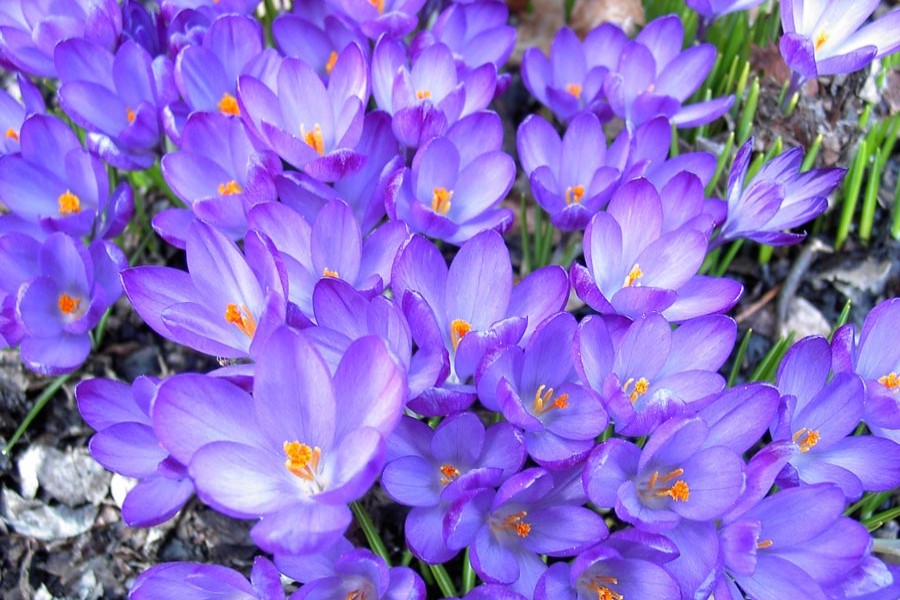RAJSHAHI, Oct 22: Saffron, the costliest spice in the world, is being experimentally cultivated in Rajshahi. Though the spice is being experimentally cultivated in the country for last seventeen-year, this is for the first time the spice is being cultivated in a tiny scale in Rajshahi. Included in the family Iridaceae and sub-family Crocoideae, saffron is being used worldwide as the most coveted royal spice which costs more than Tk 100,000 per kg.
It is learnt, the saffron was first used to write spiritual scripts in Persian gulf countries during the ancient time. The word saffron is derived from the Arabic word Faran. Gradually, the spice got popular as a household cooking item to the royal family members of Kandahar, Khorasan, Kashmir and entire Indian sub-continent.
In Bangladesh, the cultivation of saffron started at some BADC Horticulture Development Centres in 2000. Those centres are situated at Kasimpur of Gazipur, Pabna, Rangpur, Bandarban, Jamalpur, Lama and Daulatpur of Khulna. Tubers of 15 to 20 plants were transplanted in each centre experimentally. Later on, the leaves grew from the tubers and the onion like leaves grown into small herbs and after 70 to 80 days of transplanting, 25 to 30 flowers bloomed in each plant. Filamnets of Stigma of and Stamen of the live flowers are removed carefully and are dried in the sun. And these dried filaments are known as saffron.
Despite a satisfactory result of the experimental cultivation of saffron, its wide cultivation throughout the country could not be practiced due to lack of proper steps by the concerned authorities. The saffron has a wide demand worldwide and by cultivating saffron in a fragment of land, thousands of unemployed people of the country would become self reliant and after meeting the local demand, the prized spice can also be exported abroad.
According to some beneficiaries, saffron is used for preparing aromatic, coloured Polao, Biriani, Jarda and Kalia. Many people also like to take a piece of filament of saffron during chewing of betel leaf. The colour of saffron is also used for preparing various herbal medicine and it is an essential item for the beauticians. Saffron Sherbet is also famous among people of various countries and many Islamic spiritualist Imams used the saffron-water to write Quranic verses on ceramic plates and by washing the plates with water, it is let to drink to an ill person to cure various diseases.
Saffron which is also known as 'Red Gold' was learnt to originate from Greece and it is now widely cultivated in Pakistan controlled Kashmir, Jammu, Afghanistan, Iran, Turkey, Greece, Egypt, China and Spain.
Collecting stigma from the blooming flower of saffron plant, was a labour intensive work. To collect just one gram of saffron, stigma of nearly 150 blooming flower is needed to be removed and collected. During the first year, only 40 to 60 per cent plants are bloomed but from the second year, every plants are bloomed with two to three flowers and continued to grow with time. The scientific name of saffron is Crocus sativus which belonged to Crocoideae family. The plant grows around 30 cm long.
In Rajshahi, the saffron is experimentally being cultivated on a tiny scale at Kalma union of Tanore upazila. Local Member of Parliament Omar Faruque Chowdhury was cultivating the plant in his own initiative at his garden. Moreover, saffron is being cultivated at Maskatadighi village under Kantakhali municipality of the district. The owner of the experimental plot of the saffron requesting anonymity said saffron was a high value crop. By cultivating the saffron only on two to three decimals of land a person can become self-reliant. The governmental agencies as well as non-governmental organisations should come forward to expand cultivation of this precious, high value plant so that thousands of unemployed people of the country could get employed and become self-reliant.


